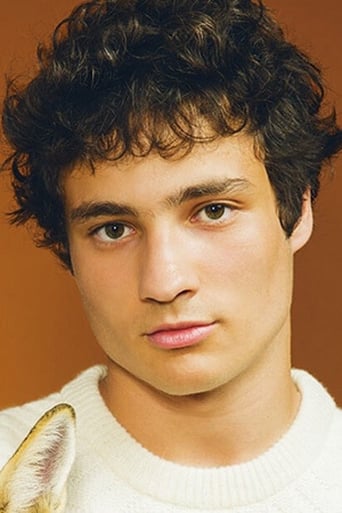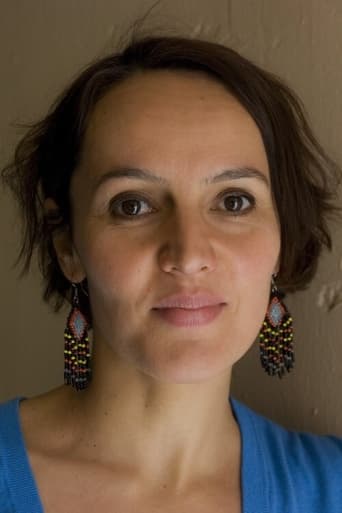Cathardincu
Surprisingly incoherent and boring
Kaydan Christian
A terrific literary drama and character piece that shows how the process of creating art can be seen differently by those doing it and those looking at it from the outside.
Matylda Swan
It is a whirlwind of delight --- attractive actors, stunning couture, spectacular sets and outrageous parties.
The_late_Buddy_Ryan
"My Golden Days" came out in 2015 as a late-breaking prequel to Desplechin's mid-90s classic "My Sex Life... or How I Got Into an Argument," which may be the best film since "Lucky Jim" about life on the lower rungs of the academic ladder. Once again, Mathieu Amalric plays Paul Dédalus, now returning to France after a decade or so doing ethnographic fieldwork in the former Soviet Union; a farewell tryst with his gorgeous Russian girlfriend (Dinara Drukarova) unleashes a cascade of memories: In a brief prologue, 10-year-old Paul flees his mentally unstable mother and takes refuge with his great-aunt and her Russian lover. Next, he recounts a daring high-school exploit to an urbane French spook, who wonders why he (and his passport) have doppelgangers in Australia (long story!), and in the longest, most significant episode, he relives an intense love affair with a classmate of his younger sister's, Esther, a clever, soulful, sexy, needy, neurotic young woman (she grows up to be Emmanuelle Devos in "My Sex Life"; here she's played brilliantly by Lou Roy-Lecollinet).Trigger warning: Paul and Esther communicate in improvised love lyrics (as befits two alumni of the Lycée Baudelaire); Esther's pouty histrionics may evoke bittersweet memories of post-adolescent romance, or may just seem too precious to be endured. Your call! This final episode starts to drag a bit as Paul soldiers on as an unfunded grad student in Paris, sleeping in hostels, couch surfing and ménage-à-trois-ing it with a congenial older couple while Esther mopes her way through "a stupid college course" and cheats on him repeatedly. Luckily, Desplechin props up his sometimes rambling storyline with ingenious staging and cinematography: When Paul first approaches Esther, he's surrounded by a windblown swirl of fallen leaves, which is echoed in the final scene as he strides into what looks like a blizzard of torn-out pages from a book (they're both "feuilles" in French, I guess; does it mean that this chapter in his life is coming to an end?); hard to put into words but it's a lovely effect. Finally I should mention the first-rate period soundtrack: The Specials, De La Soul, "Atomic Dog" and Run-D.M.C. It's a remarkable film, though, again, a certain tolerance for post-Truffaut coming-of-age shenanigans is required.
Turfseer
Arnaud Desplechin first introduced his protagonists, the young Paul Dédalus and his girlfriend Esther, way back in 1996 in his highly successful "My Sex Life... or How I Got into an Argument." Now he brings Dedalus (Mathieu Amalric) back again as an adult, just having returned from his work as an anthropologist in Tajikistan. The film is divided into three segments, with an adult Paul reminiscing first about his childhood, chronicling an abusive father and depressed mother, who eventually commits suicide. There's not much to the first segment but the second proves to be the most interesting. After being detained by government security forces, Paul explains why another Paul Dedalus, with origins in Russia, has turned up with his passport.Paul is subjected to an interrogation by a security agent which allows him to explain how he gave up his passport while on a high school trip to Russia so that a Jewish teenager could use it to escape to Israel during the time of anti-Semitic persecutions of Jews in the Soviet Union during the late 80s.But My Golden Days turns from being a suspense thriller to a more conventional coming of age story when the young college student Paul (played convincingly by Quentin Dolmaire), falls for Esther, a high school student who is the same age as Paul's sister, Delphine.After having seen the film a few weeks ago, I had trouble recalling details about Paul and Esther's romance-- so I turned to a few critic's reviews to refresh my memory. Short on plot description, some reviews are content to provide a few amorphous descriptions of the nature of the relationship.Kenneth Turan, writing in the L.A. Times, briefly explains, "We see them playing out the drama of attraction and insecurity, inexorably drawn to each other but having to face the problems different personalities invariably bring to relationships."Peter Travers in Rolling Stone feels there's something quite deep about what happens between Paul and Esther: "Memory gives the movie a formal frame, but Desplechin laces the past with such raw emotion that nothing is hemmed in. Love hurts, that's for sure. And Desplechin makes sure we feel it."Stephanie Zacharek writing in Time Magazine provides a few more details about Paul and Esther's burgeoning romance: "It takes a long time, in this eternal nighttime, for Paul and Esther to connect. Their flirtations are stilted at first, especially since Paul feels threatened by her many suitors, and she doesn't need to lie about their numbers: Young men cluster to her, as Marlene Dietrich sang, like moths around a flame. But ultimately, it's Paul she chooses, and their liaison starts out sweet before wending its way into l'amour fou territory."Frederic and Mary Ann Brussat writing in Spirituality & Practice believe Desplechin is on to something in what they see as a nuanced portrait of the protagonist's motives: "He reveals the delights and the dangers in our idealization of the beloved, our dizzying capacities of infatuation, the primal longings for each other, and the pain and pleasure which this state of romantic arousal engenders. The Brussats perhaps provide the best summary of the third segment. They note that Paul puts Esther on a "pedestal" but still leaves her behind when he goes to Paris for school. There is a sub-plot emphasizing Paul's competence in his chosen field when he convinces a noted anthropology professor to accept him as a student.Later Paul and Esther share intimacies through a series of love letters but their separation leads to the deterioration of their relationship. As the Brussats put it, Esther "begins to fall apart emotionally and he is at a loss for what to do in response." Finally Paul seeks solace with an older woman and never seems to get over Esther's decision to go out with his best friend, Kovalki, with whom Paul meets up at film's end, and is unable to contain his anger towards. Ultimately Desplechin's portrait of a failed adolescent relationship suffers from a lack of gravitas or high stakes. I would contrast this film with Bergman's "Summer With Monika," where a femme fatale destroys the relationship an earnest young man develops with a young woman who is not what she initially appears to be.Esther, on the other hand, is simply a spoiled neurotic and Paul's inability to shed all the misplaced anger from such an earlier time in his development marks Desplechin's narrative as decidedly inconsequential despite all his "innovative" split-screens and entertaining 80s soundtrack.Francophiles will undoubtedly dig all the "passion," but this dyed-in-the-wool American views this more as a generic tale of adolescent loves lost.
Andres-Camara
Starting with a sequence, if I removed it would not happen anything, since it would not interfere anything in the film, for my taste, it stays with the part of the history of this personage less interests me. The film is a simple love story of two kids.I do not like the character of the Lou Roy-Lecollinet or, rather, its evolution. I do not understand why she draws her so submissive and dependent. Of course, she does it very well. He is also very well.The grief of the film is that there comes a time when I do not know if you are telling me a story cinematically or you are telling me with voice-over and actors looking at camera. Personally I like to see what happens on the screen, not that a voice tells me. I know it's part of the cinema, but I do not like it. Especially when solving situations with a plane that counts nothing and voice-over.The film, to my taste in boredom. More than anything, because I'm not interested in what you're telling me. When I discovered that the film was going to go, I thought I preferred the history of Russia, but sadly this story lasted only a few minutes in front of the love that has become eternal.The photograph is typical of French film, white and without contributing to the story.The address is simple. So much that it does not realize that it bores, at least to some spectators. His plans are observant, do not tell history, do not contribute. Neither are well compounds.I imagine that less and less of cinema, but to me this type of cinema I do not like.
Amari-Sali
One event in which Paul allows a Russian person a forged identity, which essentially is his, to go to Israel brings up old thoughts as he is stopped, decades later, at an airport. Old thoughts of perhaps the only girl consistently in Paul's life who was both mesmerizing and infuriating. Yet over 10 years they broke up and got back together. Cheated on one another with strangers, and in her case with his friends and family, yet though too volatile to stay together, they were too drawn to one another to stay apart. This tale is their slightly twisted love story featuring what often kept Paul away from being where Esther wanted him.CommentaryAmerican romance films are often simple. Girl meets boy, girl usually is there to help the boy become a better person, boy doesn't appreciate it till it is almost too late, then he does a grand gesture for a happy ending. This, to me, is the norm. Making it so when movies like 500 Days of Summer come out, they become cult hits. With French cinema, though, it seems the opposite is done. Happy endings are few and far between and while usually the focus is on the male and him learning and growing still, things are drastically more complicated.You see, despite the French being considered the romantics, there is a line drawn between words of love and acts of passion. The words are what we believe are their culture. Things said which makes you swoon and flutter your eyes like a fool. However, the passion is often anything but romantic. The fights, the betrayals! Oh, there is nothing simple about romance in French films. In this movie, Esther is the girl who supposedly all the girls hate and all the boys either wanna be with or sleep with. She seems so assured of herself to the point of arrogance. A trait Paul quite admires as he approaches her with seemingly no romantic experience. Yet, somehow, he turns this lioness into a sheep. One who needs him desperately to the point it is surprising the only damage she does to herself is sleeping around with people and not drinking and drugging herself into oblivion. But, despite her being open with her transgressions, and he to her, it is weirdly accepted because often there is a distance between them.Their back and forth is often wild and confusing. Especially with her sleeping with those who are his friends and family. Those who should be supporting Paul's relationship with her are the ones taking advantage of his absence. Yet there is so much forgiveness for reasons you can never understand why.Yes, Paul and Esther are cute together, but her clinginess and aversion to being social makes them seem like an odd couple when they are outside seclusion of a bedroom, rooted in a private intimacy. Though perhaps the real odd thing about this film is how this all starts with Paul being stopped at the airport for it is believe his passport is fraudulent and then us going into issues he has had with his parents and this one spy-like mission he did in Russia. To say the least, while this film is primarily focused on Esther and Paul's relationship, it creates so many arguments as to why they could never be that you sometimes wonder what the movie wants you to learn, see, or understand.Review SummaryHighlightsYou have to admire how in French cinema there often doesn't feel like a tried and true way to go. There doesn't seem to be a formula. It is just two people feeling each other out, often clashing, yet melting into one another after their shields are broken, walls were torn down, and there is nothing left but the softness of skin left to protect them.Low PointsPerhaps what bothered me the most about this film is that Esther was never allowed to become more than a love interest. It is noted she went to school, perhaps didn't have the best relationship with people, especially her parents, but she was just a mess with little explanation as to why. The time spent on the Russian story, meeting Paul's siblings, who basically disappear halfway through the film, and then this airport thing, a lot of that time, I felt, could have been dedicated to building up Esther. Though, for what I know, perhaps there is a place for Esther like characters. Women who are but love interest and that's it. Maybe it is just some political correctness planted in my head which leads me to believe both leads deserve equal backgrounds.On The FenceThe tender moments, usually when in a bedroom alone together, are when you can understand Paul and Esther's relationship always being rekindled. There is a softness to her which seemingly is only available when naked. Otherwise, insecurities, arrogance, and an inability to compromise rage in her to the point she seems less like a person and more like someone whose world revolves around Paul. A 2D depiction of someone's ex placed into a script. Which seemed a tad unbelievable considering how cool and independent she was initially shown as. Though, I guess, the argument could be that once the infatuation phase was over we got to see the real Esther.







